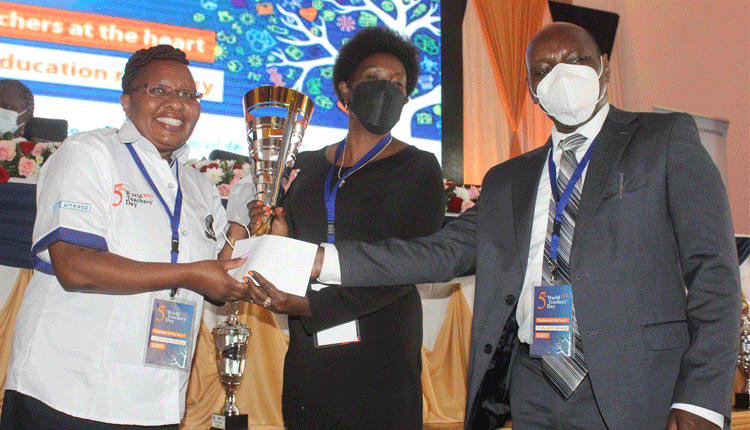Employer turned tormentor? TSC in eye of storm

The Teachers Service Commission (TSC) has been accused of dictatorial tendencies in policy formulation and implementation in line with its mandate of overseeing teacher recruitment, welfare and professional development.
As TSC led the teaching fraternity in celebrating the World Teachers Day yesterday, teachers were looking at their employer through a different prism.
The latest controversy is the implementation of the Teachers Professional Development (TPD) programme.
Stakeholders have accused the commission of ignoring the voices of the people the training is targeting.
Teachers are now regretting that a commission they pushed to be enshrined in the Constitution as an independent entity has turned into a monster that eats the very people it is supposed to serve.
TSC has been accused of improperly assigning itself the role of the regulator for the education sector, weakening or killing teachers unions, forcing policies and regulations through threats and intimidation and open bias in staffing, transfers and delocalisation of teachers.
In the cold
On Monday, the newly formed Kenyan Teachers National Pressure Group accused TSC Secretary Nancy Macharia, the Kenya National Union of Teachers (Knut) and the Kenya Union of Post-Primary Teachers (Kuppet) of conspiring to oppress teachers.
“Whenever we see the secretary general of Knut and Kuppet sandwiching Nancy Macharia between them and keeping her warm as teachers continue to suffer in the cold, we are not happy at all,” the group said in a statement read by Martha Omollo.
The pressure group accuses TSC leadership of arrogance and high-headedness in dealing with teachers.
“TSC cannot be an employer and a regulator at the same time. It’s time Parliament considered separation of duties, responsibilities and powers, and establish an independent regulatory body for teachers,” they said.
But Macharia downplayed the accusations that the commission had become overbearing, saying it was only undertaking its mandate as enshrined in the Constitution.
“We have heard all sorts of claims but we are just doing our job. We have no time to listen and respond to distractions,” she said.
A former director at the Ministry of Education Alex Majani blames TSC’s problems with teachers on inept Ministry of Education officials.
“The TSC has no role to play in quality assurance. According to the Constitution, quality assurance is supposed to remain an advisory unit under TSC,” Majani said.
He said that while the commission’s role is confined to human resource management, it had widened its scope to include curriculum development and quality assurance.
TSC has been accused of creating parallel quality assurance offices in counties to take away the functions of Directors of Education.
To offer the controversial TPD, the commission has contracted Kenyatta University, Mount Kenya University, Riara University and Kenya Education Management Institute (KEMI). Teachers are required to pay Sh6,000 per year for the training.
But teachers have protested, saying they were not involved in the formulation of modules as agreed in 2017. They also want TSC to bear the cost of the training
The commission has, however, dismissed the complaints.
Parliament has waded into the controversy, with MPs vowing to stand with teachers.
Besides the refresher courses row, TSC has been accused of using unorthodox means to kill Knut, by among other things, cutting the flow of members contributions and fighting its leadership, notably deregistering its then secretary general Wilson Sossion.
Interviews with Ministry of Education officials, teachers and education stakeholders painted a picture of an aggressive and overbearing leadership at TSC.
Clement Gicharu, an education consultant who has interacted with unions and TSC, termed the commission “the tormentor of the Kenyan teacher”, saying it has been working with other government functionaries to kill the unions, thus reduce avenues through which teachers can agitate for their rights.
Monthly dues
Gicharu also said that TSC has been arm-twisting unions to sign agreements that are oppressive to the teachers.
And where unions become adamant, Gicharu said, the commission had been using all manner of threats, including withholding monthly dues or deregistering officials, like it happened with Sossion whose name was struck out of the teachers register.
“The Kenyan teacher is exposed. All the unions have been technically muzzled by TSC and the ultimate objective is to kill them.
Unions are signing cashless collective bargaining agreements because the commission has been dangling the carrot of monthly dues.
As a result, teachers are demotivated because their issues have been neglected,” Gicharu said.
Teachers say that while Macharia – in the media and other communication platforms – paints a picture of cordial working relationship with the unions, the reality is different.
Critics also say the commission starved Knut of resources by offloading over 70,000 primary school teachers from the union’s membership register, meaning they could not pay dues to the union.
TSC is also said to have taken over the control of the management of school finances by empowering principals to be the secretaries of the Board of Management, thus taking away the financial management role from the Ministry of Education official.
“Since the new Constitution came into place, TSC has never had any working agreement with the Ministry of Education.
In fact it has been usurping the work of the Ministry of Education and at one time, the ministry had proposed to tame the commission by whittling down its powers.
They unions defended it, but the commission has turned against them,” Gicharu said.
In April, Macharia found herself at war with teachers over the proposal to abolish the Bachelor of Education degree (B.Ed), through which thousands of students have trained to become teachers, as part of reforms to usher in the Competency-Based Curriculum (CBC).
Instead that students were to pursue Bachelor of Arts and Bachelor of Science courses for three years, followed by a one-year post-graduate diploma to qualify for teaching in junior and senior secondary school.
Experts said the proposal was outside the mandate of TSC as it does not have the powers to control university education curriculum which is the preserve of the Commission for University Education.
The decision was opposed by Kenyatta University UASU officials who said the framework was in bad taste, since it could water down the education system.
According to UASU officials, teachers require specialised training right from the beginning.
While agreeing that all was not well between unions and TSC, Emuhaya MP Omboko Milemba, who is the chairman of Kuppet, said there was need to develop a cordial working relationship between the unions and the commission.
“TSC did not create itself, it is the teachers who fought the Wako Draft in order to include the commission and therefore there should be a working relationship where the commission operates within its mandate and where there are issues to be developed, there should be proper public participation,” the MP said.










